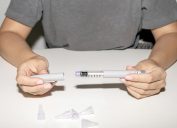How Much People Really Gain Back After Quitting Weight-Loss Drugs, New Study Finds
Researchers are looking into the rebound effect after stopping Zepbound and similar medications.

Ozempic has taken the world by storm over the last year, finding fame as the secret behind Hollywood's weight-loss craze. Alongside it, several other similar weight-loss drugs—Wegovy, Mounjaro, and, most recently, Zepbound—have begun rising through the ranks. But while these medications may promote weight loss, they're not miracle drugs. For one thing, many patients have reported concerning side effects. Then there's also the fact that weight-loss medication is intended for lifetime use—meaning that those who stop taking it will likely gain the weight back.
RELATED: Certain Foods Trigger Natural Ozempic-Like Weight Loss Effect, Doctor Says.
Zepbound, a tirzepatide injection, is the newest drug approved for "chronic weight management" by the U.S. Food and Drug Administration (FDA). This month, it officially became available to be prescribed for adults with obesity or those who are overweight, according to a Dec. 5 press release from Eli Lilly. And now, new research is looking at what will happen to patients when they stop using the medication, a common concern among all weight-loss treatments.
Eli Lilly sponsored the study, which was published Dec. 11 in the Journal of the American Medical Association. It followed 670 adults without diabetes who had taken the drug for 36 weeks. After that, half of the study's participants continued to take Zepbound, while the other half was switched to a placebo shot for another year.
During the second half of the trial, patients who continued taking the tirzepatide drug regularly continued to lose weight, dropping another 5.5 percent of their body weight on average. Those who were switched to the placebo injection, on the other hand, regained an average of 14 percent of their weight in that year.
The "overall mean weight reduction" for the total 88 weeks was 25.3 percent for those who took Zepbound the entire time, according to the study. It was 9.9 percent for those who took a placebo during the second half, indicating that they regained some but not all of the weight they had lost after stopping treatment.
RELATED: Highly Effective New Weight Loss Drug Hits U.S. Pharmacies Amid Ozempic Shortage.
"If you look at the magnitude of the weight gain, they gain back about half the weight they had originally lost over a one-year period of time," lead study author Louis Aronne, MD, obesity medicine specialist, and professor of metabolic research at Weill Cornell Medicine in New York City, told CNN.
Aronne admitted that based on his experience, he believes that it is likely the people on the placebo would just continue to gain back the weight they had lost while on Zepbound.
"How long would it take? I honestly don't know," he said
But there is some good news: This might not be the case for everyone who quits the weight-loss drug, according to Aronne.
"It's not like every single person regains weight," he noted. "One out of six, this would say, is able to maintain the weight loss without medication."
RELATED: For more up-to-date information, sign up for our daily newsletter.
Best Life offers the most up-to-date information from top experts, new research, and health agencies, but our content is not meant to be a substitute for professional guidance. When it comes to the medication you're taking or any other health questions you have, always consult your healthcare provider directly.





















